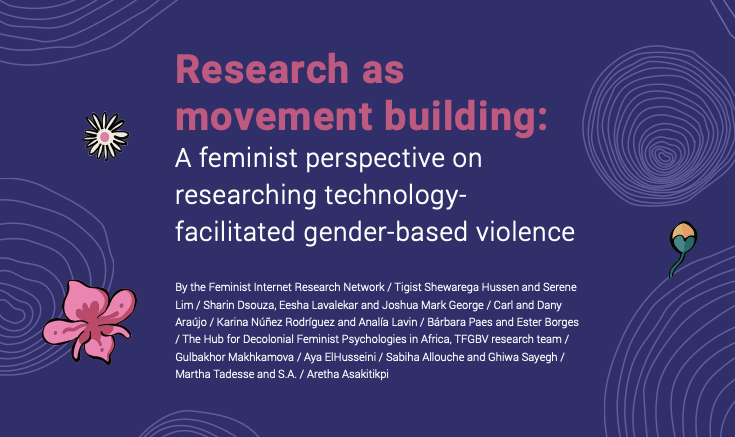Research as movement building: A feminist perspective on researching technology-facilitated gender-based violence
This GenderIT edition by FIRN is a collection of 11 reflections and analytical essays by FIRN and FIRN’s research partners on what it means to do research at this critical juncture, while having to go through the unbearable pain of witnessing genocide, conflict and war, gross and persistent human rights violations, criminalisation of sex work and LGBTQIA+ communities and intensification of anti-gender mobilisation, as well as operating under spectacularly failed international law, solidarity and transnational feminist movements.

For many, a feminist approach to researching technology-facilitated gender-based violence is a process of retaliation, resistance and reclaiming power. Through the process, researchers disrupt the hierarchical structure of knowledge formation, offer a different perspective on who gets recognition as a knowledge producer, communicate violence/resilience in their own terms and use research as an entry point to network, connect and organise the community. Central to this deeply meaningful process is a researcher’s emotional connection and level of care for their research. Employing feminist research methodologies helps us understand that our knowledge about a specific topic is deeply connected to how much we care about the subjects we are exploring and the communities we work with, rather than for.
This FIRN GenderIT edition is a collection of reflections and analytical essays by FIRN and FIRN’s research partners on what it means to do research at this critical juncture, while having to go through the unbearable pain of witnessing genocide, conflict and war, gross and persistent human rights violations, criminalisation of sex work and LGBTQIA+ communities and intensification of anti-gender mobilisation, as well as operating under spectacularly failed international law, solidarity and transnational feminist movements. Together, these articles show that care should not be framed as an ethical framework in a research process, but to inform the epistemological interest, from shaping the research agenda to reporting findings that, even imperfectly, capture the narratives, discourses, and insights acquired during the process.
This edition was originally published on GenderIT.com on 23 April 2025.
Caring to know and make a difference by Tigist S. Hussen and Serene Lim
In this edition, we reflect on our experience conducting feminist research through an intersectional lens and what it was like to do fieldwork. We address questions about intersectional power relations, participants' autonomy over their own narratives, and their role as co-knowledge producers, along with the security of research data, ethical considerations, and our accountability to the community.
Beyond knowledge production: Can research be a site for more? Reflexive notes by Aya ElHusseini
In this critical reflection of her experience in conducting feminist research on the implication of TFGBV on women and LGBTQ+ people in Egypt, Aya explores research as a site for community building and organizing.
“What happens after you publish this research?”: How feminist research invites us to centre liberation, connection and care in our practice by Bárbara Paes and Ester Borges
Researching on the experiences of Black Brazillian women with TFGBV, the authors share their reflection on research methodology, their relationship with participants, the (imperfect) measures they implemented to navigate power dynamics embedded within the research process and recognition of research participants as the key contributors to this work.
What is method under annihilation? Notes on queerness, death and data by Sabiha Allouche and Ghiwa Sayegh
In the face of consistent violence and genocide, Ghiwa and Sabiha from Kohl opens the conversation on doing research while grieving for the destruction of lives being wiped out generation after generation by settler colonialists.
Bringing the energy home By Carl and Dany Araújo
This article by MariaLab reflects on the redefinition of technology and science as cultural carrier bags instead of weapons of domination. Throughout their research, they seek to challenge the traditional dichotomies of subject and object and conventional notions of scientific rigour when working to establish more horizontal and collaborative research relationships.
Reflecting on feminist research: From a shared experience to collaborative learning by Martha Tadesse and S.A.
In researching the multiple ways violence against LGBTQIA+ take place in Ethiopia, Martha and S.A. reflected how the broader social, cultural and political environment influence the process and how they work together collaboratively based on shared values and ethics despite the differences in terms of perspective, approaches and emotional response.
Feminist reflection on our research project by Karina Núñez Rodríguez, and Analía Lavin
The reflection from our Karina and Analia from Uruguay, shared how the shift from being an object of study to telling stories of their own sex workers community and leading the process of knowledge production. The project challenged the conception of “who” are legitimate knowledge makers, producing key knowledge grounded on socially constructed negotiation of power in real life.
Liminalities of researcher positionality: Blurring roles as researchers, counsellors and peers by Sharin D’souza, Eesha Lavalekar and Joshua Mark George
In this article, the authors reflect on the moments when we felt that their roles blurred during the study on the experience of TFGBV for transgender, non-binary and gender diverse persons in India —when “objectivity” met empathy, when boundaries felt porous and when their identities were a part of the stories that were told.
Exploring technology-facilitated gender-based violence in online dating experiences among South African youths: Reflexivity on the research methods adopted for the study by Aretha Asakitikpi
This article explores the various decisions that the research teams had to make throughout the process and how being reflexive also means being ready to revise research design, and subsequently open the doors for other ways of doing and knowing.
Black women, gender non-conforming persons and technology-facilitated gender-based violence: A decolonial feminist exploration by The Hub for Decolonial Feminist Psychologies in Africa, TFGBV research team
The research team from UCT discuss their use of decolonial feminism in their contribution to feminist politics of knowledge building and centering of participants’ voices in the research and knowledge co-creation with the participants in their research project.
Technology-facilitated gender-based violence (TFGBV): Research challenges and the feminist research approach by Gulbakhor Makhkamova
Gulbakhor reflected on the challenges in navigating a research on TFGBV in Tajikistan, where domestic violence and marital rape are not criminalised, reinforced by a culture of silence and spaces for women to be heard is almost non-existence.
